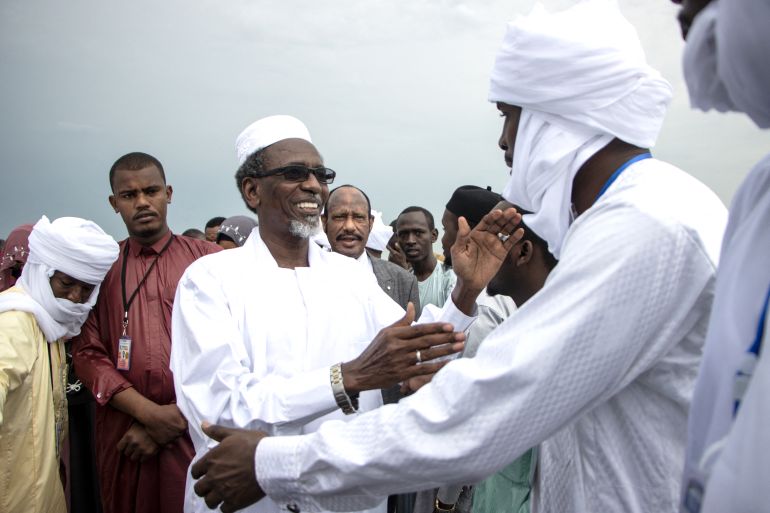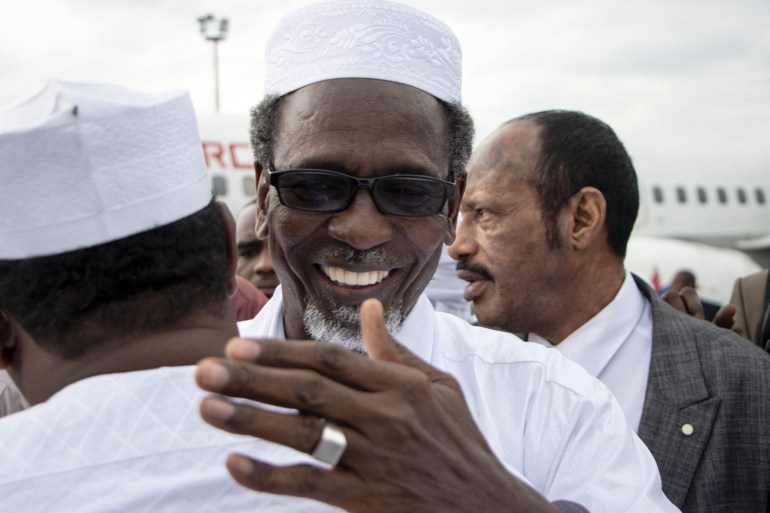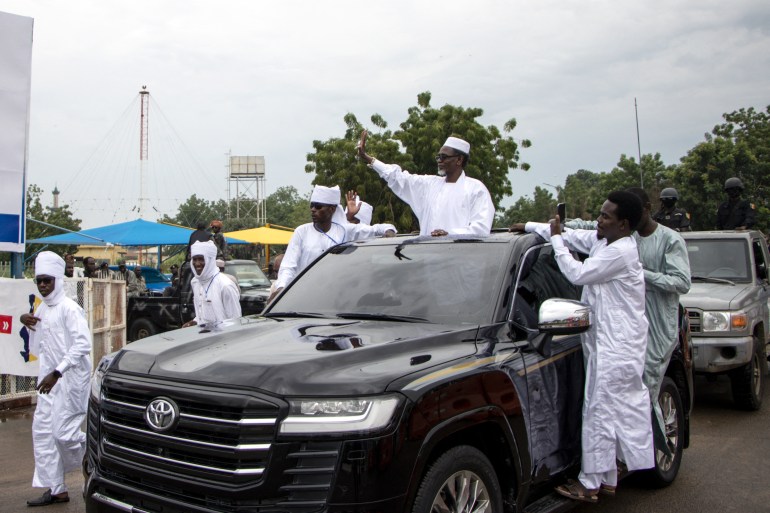Rebel leader Timan Erdimi returns to Chad after 17 years in exile
Exiled rebel leader Timan Erdimi has returned to Chad ahead of national talks designed to pave way for elections.

One of Chad’s most prominent rebel leaders, Timan Erdimi, has returned to the country after 17 years in exile, days ahead of the start of national talks aimed at paving the way for elections after the military seized power last year.
Erdimi, 67, head of the Union of Resistance Forces (UFR), left Chad in 2005 and he had been living in exile in Qatar for at least a decade. His armed group had attempted to overthrow his uncle, Chad’s former president Idriss Deby, first in 2008 and again in 2019.
Keep reading
list of 3 itemsChadians protest as anti-French sentiments hit new highs in Sahel
Will Chad’s latest peace agreement hold?
Failing to topple Deby in 2008, his UFR continued to threaten the government and in 2019 UFR-linked fighters advanced from Libya deep into Chadian territory before their convoy was destroyed by French fighter jets.
“I am very happy to return home after so many years in exile,” Erdimi said after his arrival at the capital’s N’Djamena International Airport early on Thursday.
“I hope that everything will go well to achieve peace, reconciliation and serenity in the country,” he told reporters, adding he hoped to transform the UFR into a political party.

A second rebel leader Mahamat Nouri, head of the Union for Democracy and Development (UFDD), was reported landing shortly after Erdimi.
“I am absolutely ready for dialogue,” Nouri was quoted as saying by local media.
Hundreds gathered to welcome the rebel chief, who was wearing a white robe and turban.
Nouri was defence minister under the former president before he defected. He was detained in France in 2019 on suspicion of crimes against humanity over recruiting child soldiers in Chad and Sudan. He was released the following year on health grounds.
Inclusive national dialogue
Chad’s longtime president Deby was killed on the battlefield while visiting front-line troops in April last year and his son, Mahamat Idriss Deby, was installed by the military as interim president of Chad.
The younger Deby, 38, has initiated talks with various rebel groups who have long challenged his father’s regime.
At least 40 rebel and opposition factions signed a peace pact with Chad’s transitional authorities last week, agreeing to talks that are scheduled to begin on Saturday.
However, the most powerful rebel group, the Libya-based Front for Change and Concord in Chad (FACT), which threatened to march on N’Djamena last year, has refused to participate in talks, saying negotiators did not listen to its demands.

Erdimi will be a key participant at the “inclusive national dialogue” in N’Djamena on Saturday, which will bring together 1,400 delegates from the military government, civil society, opposition parties, trade unions and rebel groups.
Deby has hailed it as a chance for reconciliation in the fractured country, opening the way to “free and democratic” elections.
The “dialogue” should have started in February but was repeatedly delayed as Chad’s myriad rebel groups, meeting in Qatar, squabbled over whether to attend.
Among political groups, Wakit Tamma, a large coalition of opposition parties and civil society groups, is also snubbing the talks.
“We estimate that 80 percent of (those attending) are close to the junta,” said Succes Masra, head of the Transformers party, which is part of the coalition.
It accuses the military of violating human rights and using the “dialogue” as a springboard for Deby’s election candidacy, something that he has previously ruled out.
Saleh Kebzabo, a vice president of the forum’s organising committee and one-time opponent of the older Deby, said the upcoming talks would facilitate a new constitution which would then be put to a referendum.
But observers say the conference faces major challenges, starting with the pressure of time.
“The timetable for the dialogue, which is supposed to last 21 days, isn’t credible,” said Enrica Picco of the International Crisis Group (ICG) think-tank.
Deby promised to hold elections in 18 months when he seized power in April last year. That 18-month deadline to hold elections runs out in October, leaving scant time for organising a referendum and then elections in this vast, arid country.
“It’s not possible to reach an agreement in such a short time,” Picco said, adding that an extension of the transition was likely.
Deby, speaking soon after taking power, also spoke of the option of extending the transition by another 18 months if need be.